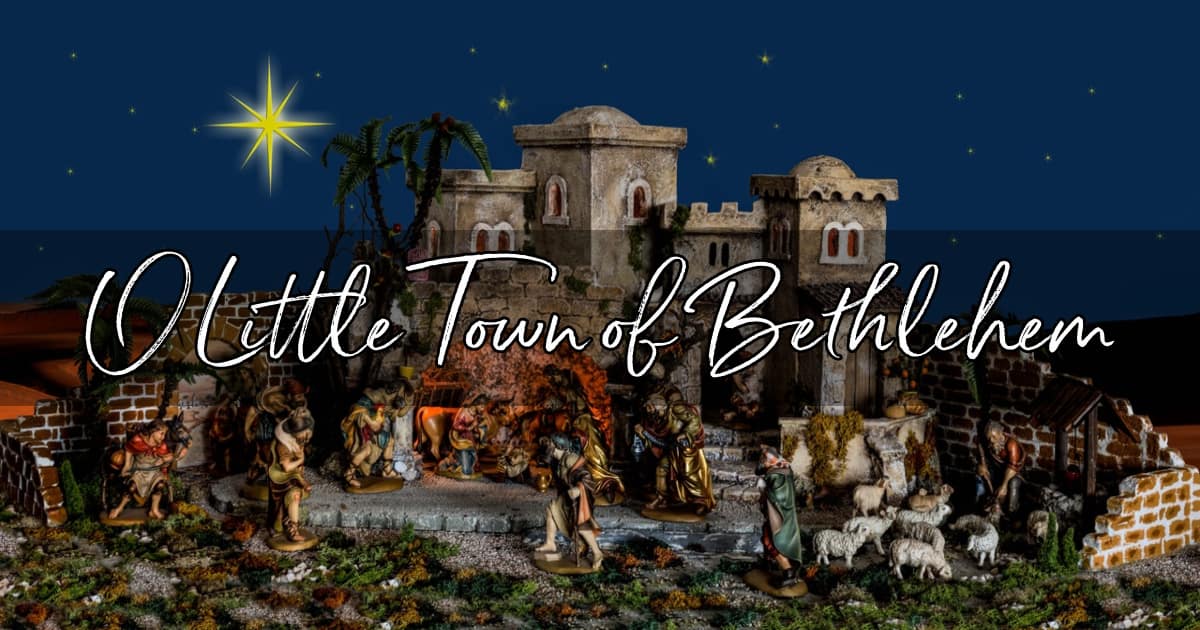O Little Town of Bethlehem – Inspired by a Civil War Preacher
O Little Town of Bethlehem is a memorable Christmas song that speaks of the old ancient town. On December 24, 1865, Phillips Brooks was a half a world away from home and feeling like an older man than his thirty years. Already recognized as one of the most dynamic Christian voices in America, it was Brooks, only six years into his ministry, who had been called upon in May to give the funeral message over President Abraham Lincoln.
That solemn honor, in tandem with leading the congregation of Philadelphia’s Holy Trinity Church through the bloody years of the Civil War, had taken its toll. Worn out and badly needing a spiritual rebirth, Brooks took a sabbatical and left the United States to tour the Middle East.
Pilgrimage Through the Holy Land
On Christmas Eve in Jerusalem, the American felt an urge to get away from the hundreds of other pilgrims who had journeyed to the Holy Land for the holidays. Although warned that he might encounter thieves, the preacher borrowed a horse and set out across the desolate and unforgiving countryside. For many peaceful hours he was alone with his thoughts as he studied a land that had changed little since the days of Paul and Timothy. For the minister, December 24 was a wonderful time of prayer and meditation.
At dusk, a sudden sense of awe fell over Brooks. Under a clear sky, the first stars just beginning to emerge, he rode into the still tiny and remote village of Bethlehem. He recalled the story of the birth of his Savior, and by being present in the place in which Jesus was born, was able to add vivid detail to the familiar tale in Scripture.
The great speaker was all but speechless as he considered the heavenly King, born in such modest surroundings. There on streets almost unchanged since biblical times, Brooks felt as if he were surrounded by the spirit of the first Christmas. He would later tell his family and friends that the experience was so overpowering that it would forever be “singing in my soul.”
The Pastor’s Winding Life.
Like the path from Jerusalem to Bethlehem, Phillps Brooks’s own life had often been rocky and winding. At the age of twenty-two, the Harvad graduate was a struggling teacher at Boston’s Latin School. Though his knowledge of his subject was great, he found it all but impossible to teach because his students wouldn’t devote the effort Brooks felt was needed to master the course. Frustrated, Brooks gave up.
Lacking faith in himself, the young man turned to prayer and Bible study in an effort to find his place in the world. Still unsure of his future, Brooks entered the Episcopal Theological Seminary and began pastoral studies. After graduating in 1859 he began his ministry in Philadelphia.

Brooks – a Powerful Orator
What Phillips Brooks had lacked in the classroom, he made up for in the pulpit. His messages were powerful and dramatic. In 1861 he was called to lead the congregation of the Holy Trinity Church in Philadelphia. No sooner had he unpacked his Bible than Brooks contacted well-known real estate agent Lewis Redner.
The preacher convinced supersalesman Redner to serve as Sunday school superintendent and organist at Trinity. Together Brooks and Redner welcomed thirty children to their first Sunday morning class. Within a year – thanks to Brooks’s preaching and Redner’s music – the Sunday and Wednesday services were filled to overflowing and one thousand children were attending Sunday school each week. Over the next two years those numbers continued to build.
The American Civil War Takes its Toll…
Yet even as Holy Trinity grew and his fame spread far and wide, Brooks was growing physically and spiritually tired. By 1863, in the midst of the Civil War, the national spirit was dying almost as quickly as the soldiers on the battlefields.
Everyone knew someone who had been killed or gravely injured in the conflict. Scores of women in the church wore black as thy mourned the loss of a husband or son. While the preacher tried to fight it, darkness fell over every facet of the services. Brooks was severely taxed each time he stood in front of his congregation. They wanted him to be inspirational, to believe that the good things in life they had once known would someday be theirs again. They wanted an end to the war. Yet even though he made a valiant effort, the preacher couldn’t give his flock what they needed most: peace.
Brooks Speaks at Lincoln’s Funeral
When the war finally ended, the visibly fatigued Brooks felt that the sweetness of life and the soul would soon return to his flock. Yet the pain only intensified when President Lincoln was assassinated. Although he was not Lincoln’s pastor, and felt ill prepared to preside over the ceremony, Brooks was asked to speak at Lincoln’s funeral because of his reputation as an orator. Digging deep, he found words to fit the moment, but seeing a great leader senselessly slain and the exhaustion of the effort itself left him void of everything he needed as a pastor.
In an attempt to rediscover and restore his own faith, he left the pulpit to visit the Holy Land. It was a trip that dramatically changed his life and renewed his calling. The dark days ended, the joy of living returned, and his positive attitude again became apparent in his every step and word.
Returning from his sabbatical with renewed vigor, Brooks tried to relate to his congregation the incredible experience of walking where Jesus had walked. Yet Brooks’s unparalleled oratory still fell short. For the next three years, “the singing in his soul” remained strong, but his inability to share the stirring imagery haunted him to such an extent that he wrote the following note in his journal:
Before dark we rode out of town to the field where they say the shepherds saw the star. It is a fenced piece of ground with a cave in it, it which, strangely enough, they put the shepherds … somewhere in those fields we rode through, the shepherds must have been. As we passed, the shepherds were still keeping watch over their flocks.
He also added this experience to the log of his trip:
I was standing in the old church in Bethlehem, close to the spot where Jesus was born, when the whole church was ringing hour after hour with the splendid hymns of praise to God, how again and again it seemed as if I could hear voices I know well, telling each other of the Saviour’s birth.

Still, even after reliving this rich experience, inspiration about how to convey those amazing moments to his flock did not visit the preacher.
When Brooks looked ahead to the holiday season of 1868, he again thought of riding into Bethlehem at dusk and the church service that had followed. This time, he didn’t force the words out, he simply relived the experience and jotted down the lines that seemed to float into his head. His thoughts soon took the form of a poem. When he finished, he hurried to share it with Lewis Redner.
While reading the simple words. Redner finally understood the power of what Brooks had experienced in the Holy Land. To further share this message, the organist tried to compose music to accompany the poem. For hours he struggled at the piano. Finally, on December 24, as Redner went to bed, he was forced to admit he had failed.
Just as Brooks had been unable to find dynamic oratory to fully describe what he had experienced in Bethlehem. Redner was unable to compose a majestic rhapsody to carry the preacher’s simple words. It was only in his bed, long after he had given up his efforts, that the organist found an unadorned and straightforward tune. Rubbing the sleep from his eyes. Redner discovered the tune given to him in slumber perfectly fit Phillips Brooks’s words. As if blessed by God himself, on Christmas morning “O Little Town of Bethlehem” was complete.
For the next six years “O Little Town of Bethlehem” was a Philadelphia favorite. Printed in cheap leaflet form, almost every church in the city used it during their Christmas services. In 1874, William Huntington published Brooks’s impressions and Redner’s music in the The Church Porch music collection. By the time of Phillips Brooks’s death in 1893, “O Little Town of Bethlehem” had become one of the most beloved Christmas carols in the world.
Phillips Brooks is now recognized as the greatest American preacher of the nineteenth century. His first volume of sermons sold more than two hundred thousand copies when released in 1878 and is still read and studied today. There is even a building named for the preacher at Harvard University.
Yet it is the songwriter, not the preacher, whose work millions now know and cherish. It is the simple language of a common traveler in search of spiritual renewal that continues to touch lives today. In a sermon Brooks once said, “it is while you are patiently toiling at the little tasks of life that the meaning and shape of the great whole of life dawns on you.”
On a horse, in a tiny village, a half a world away from his home and family, the meaning of Phillips Brooks’s life and the purpose behind his work were brought into sharp focus. Since that time, millions have been blessed because of his ability to share his revelation with the world.
For More Information on the Town of Bethlehem – Follow this Link…
Bethlehem | History, People, Meaning, & Facts | Britannica


